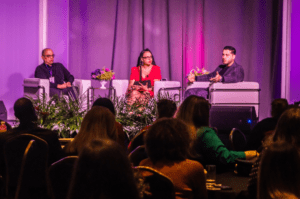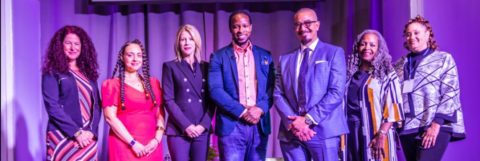Four weeks ago, more than 300 civic leaders working in diversity, equity, and inclusion (DEI) convened at the inaugural Just Lead: Advancing Racial Equity Conference hosted by New Detroit, a racial equity organization with over 55 years of making a difference in the region.
The hybrid Conference spanned two days, providing attendees with up-to-date information on key issues related to racial equity and equipping them with motivation, tools, and support to advance racial equity individually and collectively.
“The hope for this Conference was really to kind of get away from the idea of just having a dinner to celebrate something that’s really a matter of critical importance in the country right now,” said Michael Rafferty, president and chief executive officer of New Detroit. “New Detroit, for a long time, had been doing the Closing the Gap dinner… an event that’s just focused on selling tickets just didn’t seem to be the right approach. What made sense was to bring people together to get further inspired for the work of racial justice and walk away with a sense of purpose and understanding about what we should do.”

Photo Credit: Glenn Kujansuu
During the Conference, attendees heard from national and local speakers like Dr. Ibram X. Kendi, Charity Dean, and Dr. M. Roy Wilson about their different experiences and perspectives in racial equity and justice work surrounding the topics of health care, housing, business, and education. According to Rebecca Irby, director of programs and services for New Detroit, looking at equity through this intersectional lens was intentional.
(View the digital program book from the Conference here.)
“Intersectionality is so critically important… the deeper understanding of the history and the systemic nature of racism [is] so important,” Irby said. “How we help folks understand that systemic nature is by having these different verticals that we’re able to point to and speak to and show that ‘okay, we said racism’s in the air that we breathe, this is how the breathing is affecting this community right here in this specific area.’”
Rafferty agreed with Irby, stating that he looks at racism like metastatic cancer.
“If a body is filled with cancer, you can go to the doctor and start talking about the individual symptoms. If the doctor is like, ‘I’m going to give you anti-nausea medication because you’re throwing up; I’m going to give you aspirin because your head hurts; here’s some lotion because you’re losing your hair’ or whatever the case. It’s not chemotherapy, but it is important to talk about the symptoms to be able to get to the point of the root cause.”
Rafferty also shared that breaking equity into its different sections and exploring its impact in each is a great way to make the business case for equity.
“[During the Conference,] we started talking about racism as systemic, and then we did breakouts because human beings, I think in some ways, are more inclined to take things bite by bite,” Rafferty said,” If I look at how policymakers and organizational leaders tend to think about their responsibility and their role in ending racism, they think about it in terms of what’s the business case, what’s the value proposition, what’s the bottom line, what’s the motivation? And there is a business case for race equity.”
While the Conference was an overarching success, New Detroit hopes to grow this annual event in volume and impact every year. One of the main ways it plans to do this is expanding the diversity of attendees. Rafferty referenced the Detroit Regional Chamber’s annual Mackinac Policy Conference, which convenes Michigan’s top business, government, civic, and philanthropic leaders, as an example of the diverse representation he wants to see at New Detroit’s Just Lead Conference.
“Everyone stands to benefit, and everyone stands to gain from the common thing that we’re trying to create here. I want to see more diverse representation in the audience,” Rafferty said. “I want to see more people who are representing Fortune 500… I definitely want to see people who are going to go back to the board rooms, go back to the corner offices. I want to see those same people sitting with community groups and learning from them and being inspired by them. So, next year, it’s furthering our reach.”
Individuals and organizations interested in getting engaged with New Detroit outside of its annual Conference can visit New Detroit’s website and explore its recently launched Just Institute, which offers self-paced and live courses in racial equity, cultural competency, and more.


